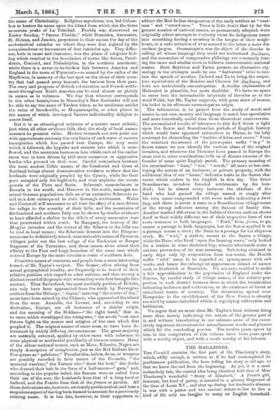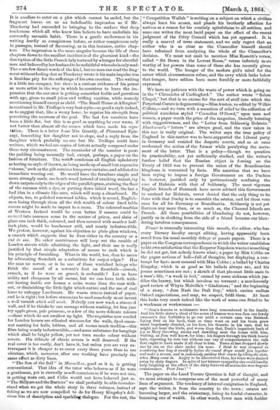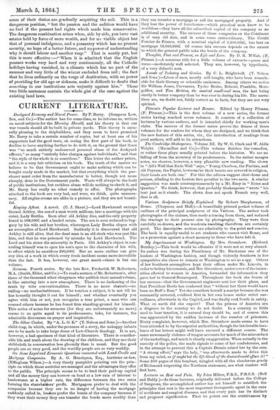THE MAGAZINES.
THE Cornhill contains the first part of Mr. Thackeray's story, which, oddly enough, is written as if he had contemplated its posthumous publication, the hero telling his story in old age, so that we know the end from the beginning. As yet, it is a most melancholy tale, the central idea being identical with that of Miss Thackeray's wonderful " Story of Elizabeth." A French girl, innocent, but fond of gaiety, is married to a gloomy Huguenot of the time of Louis XV., and shut up during her husbands absence in war with a pastor and two ancient sisters-in-law to live a kind of life only too familiar to many an English household. It is needless to enter on a plot which cannot be ended, but the fragment leaves on us an indefinable impression as if Mr. Thackeray had succeeded in bringing to the surface that deep tenderness which all who knew him believe to have underlain his outwardly sarcastic habit. There is a gentle mellowness in his writing hardly so conspicuous before, or rather conspicuous only in passages, instead of flavouring, as in this instance, entire chap- ters. The impression is the more singular because the life of these chapters down to the smallest incident is of the gloomiest kind—the description of the little French lady tortured by a hunger for cheerful- ness. and believedby her husband to be unfaithful when she is only mad- Thei e are few direct words of the kind, but no man can read the frag- ment withoutfeeling that as Thackeray wrote it his main impulse was a limitless pity for the sufferings of his own creation. The writing is a little too compact, but there is a curious evidence of his power as mere artist in the way in which he contrives to leave the im- pression that the narrator is getting somewhat feeble and garrulous with age, given to small jokes and trifling vanities, while scarcely mentioning himself except as child. "The Small House at Allington" is continued in Mr. Trollope's very best style—so good a style indeed, as to suggest that, like a weary horse, he regains his strength from perceiving the nearness of the goal. The last few numbers have been a little flat, but this is as good as anything he ever wrote, if not better than almost all the scenes which have made his repu- tation. There is a letter f torn Mrs. Grantly, of Plumstead Epis- copi, beseeching her daughter not to elope, and a reply from the daughter which probably no one but Mr. Trollope could have written, which we feel are copies of letters actually composed under those very circumstances. The remainder of the number is poor, the padding being unusually bad, except, perhaps, a paper on the fashion of furniture. The write condemns all English upholstery as having no style of its own, as being made up of small but expensive 6 shams," such as the gilt cornices hung over curtains, and addicted to immediate wearing out. He would have the furniture simple and more strongly made, use beech-wood instead of cracking walnut, lay down carpets only to the edges of the parallelogram, staining the floor of the recesses with a dye, or putting down inlaid wood, the last a bad idea in a climate like ours, which will warp a chessboard. He objects, too, to polished rosewood tables, which is sound, English- men losing through them all the rich wealth of colour fixed table covers might be made to impart to a room. The coloured marbles of Western Ireland would be even better if masons could be coerced into common sense in the matter of prices, and slabs of glass one inch thick, coloured, and then covered with another half- inch plate, would be handsomer still, and nearly indestructible. We protest, however, against his objection to plate glass windows, a remark which suggests that he lives either in the country or a cul de sac. No other contrivance will keep out the rumble of London streets while admitting the light, and their use is really justified by that simple adaptation of means to ends which is his principle of furnishing. What in the world, too, does he mean by advocating floorcloth as a substitute for carpet edges ? Has the man no nerves, or is he one of those wretched beings who think the sound of a servant's foot on floorcloth—crunch, crunch, as if he were on gravel, is endurable ? Let us have utility and cheapness by all means, but we can have both with- out having inside our houses a noise worse than the roar with- out, or diminishing the little light which nature and the use of coal leave to unhappy Londoners. He wants stucco instead of paper, and he is right; but before stucco can be used somebody must invent a wall varnish which will wash. Nobody can now wash a stuccoed wall, and if he thinks he can manage without washing, let him just try apple green, pale primrose, or a few of the more delicate colours —those which do not swallow up light. The requisites now needed for London houses are silicated stuccoes for the walls, dyed cocoa- nut matting for halls, lobbies, and all rooms much trodden—this fibre being nearly indestructible, —and some substance for hangings which shall be bright yellow, yet not turn smoke colour without covers. His ridicule of chintz covers is well deserved. If the real cover is too costly, don't have it, but unless you are very ex- travagant it is cheaper to re-cover every three years than to use chintzes, which, moreover, after one washing have precisely the same effect as dirty linen.
"The Son of the Soil" in Macntiatn, good as it is, is getting conventional. That idea of the tutor who behaves as if he were a gentleman, yet is eternally as self-conscious as if he were not one, is getting worn out, and Colin would not have behaved just so. "The Hillyars and the Burtons" we shall probably be able to under- I stand when we get the whole story in three volumes, instead of fishing as we are now compelled to do for Henry Kingsley's deli- cious bits of description and sparkling dialogue. For the rest, the " Competition Wallah " is writing on a subject on which a' civilian always loses his senses, and pleads his brotherly affection for natives as a reason for his cousinly spitefulness to all settlers, and
some one writes the most lucid paper on the effect of the recent judgment of the Privy Council which has yet appeared. It is really a marvel of terse statement, and we only regret that an author who is as clear as the Chancellor himself should have refrained from analyzing the whole of the Chancellor's decision. We must not omit to mention Miss Rossetti's verses, called " Sit Down in the Lowest Room," verses infinitely more worthy of her powers than some of those she has recently given to the world. The hunger of the modern girl's mind for the career which circumstances refuse, and the envy which larks below that hunger, have seldom been more forcibly or more faithfully expressed.
We have no patience with the waste of power which is going on in the " Chronicles of Carlingford." The author wrote " Salem
Chapel," but that is no excuse for the sort of stuff into which the Perpetual Curate is degenerating—Miss Austen, re-edited by Wilkie Collins,—and we turn with a sensation of relief to the collection of political anecdotes styled " Cornelius O'Dowd," upon men and women, a paper worth the price of the magazine, literally bursting with suggestiveness, and the " Letter from Schleswig Holstein." Blackwood's " letters " are always good, and the view taken in this one is really original. The writer says the true policy of England in this matter was to have supported the Liberal party
in Germany and resisted the despotic courts, and so at once moderated the action of the former while paralyzing the move- ment of the latter. That is a policy—though we question its practicability, not yet sufficiently studied, and the writer's further belief that the Russian object in forcing on the
Treaty of 1852 was to prevent the union of the Scandinavian kingdoms, is warranted by facts. His assertion that we have been trying to impose a foreign Government on the Duchies is, however, justified only by pertinaciously confusing the case of Holstein with that of Schleswig. The most vigorous
English friends of Denmark have never advised this Government to contend for Holstein, never denied that the only thing to be done with that Duchy is to assemble the estates, and let them vote once for all for Germany or Scandinavia. Schleswig is not yet German any more than, or so much as, the Channel Islands are French. All those possibilities of blundering do not, however, justify us in skulking from the side of a friend because our blun- dering involves consequences.
Fraser is unusually interesting this month, the editor, who has every literary faculty except editing, having apparently been saved from his usual monthly deluge.of passes papers. There is a
paper on the Congress correspondence in which the writer establishes to his own satisfaction that the Emperor Napoleon wanted something he did not get, but nobody knows what; a paper by Miss Cobbe on the pagan notions of hell—full of thoughts, but displaying a con- tempt for facts most unusual with Miss Cobbe ; a ballad by Charles Kingsley, which is as good as his ballads always are, and his
poems sometimes are not ; a sketch of that pleasant little oasis in a man's life, " a week in bed," caused by some sickness which jus- tifies the luxury, but which involves no torment ; a murderously good review of Whyte Melville's " Gladiators ; " and the beginning of a story, " Jem Nash the Dull Boy," which excites endless Oxford expectations, and may, we suspect, fulfil them. At least this looks very much indeed like the work of some one fitted to be
a workman or workwoman :—
" 'Jem's lessons in arithmetic were long remembered in the family. And his little sister's ideal of the acme of human woe was Jem one lovely summer's day forbidden to go out until a certain sum was finished. Lying first on his back, then as time went on and his brain grew more hopelessly clouded, on his face, his thumbs in his ears, that he might not hear the birds, and worse than that, Dash's impatient bark of joy at Mary throwing sticks and dawdling near the house with him, waiting, as Jem well knew, for him ; his fingers through his thick heavy hair, repeating by rote but without one ray of comprehension the rule that ought to have made it all clear to him. Tears at last dropped slowly one by one on the slate under his nose. I think he wets occupied in wondering how long it would be before the round drops would join together and make a stream, and in judiciously guiding thew course by tilting the slate, when Mary came in. Angry to be discovered thus, his tears were dashed away by slaty fingers. In spite of her intense sympathy she could hardly help laughing at the effect of the dirty furrows all across his woe-begone countenance. Poor Jam ! ' " The paper on the Land Tenure Question is full of thought, and we must attempt to compress one of the most powerful of many lines of argument. The tendency of internal emigration in England, says the writer, is from the country to the town ; estates are becoming larger, and the aristocracy, losing its feudal character, is becoming one of wealth. In other words, fewer men with feebler sense 9f their duties are gradually acquiring the soil. This is a dangerous position, " but the passion and the sedition would have no fuel if the peasant had rights which made him conservative. The dangerous combination arises when, side by side, you have vast estates held by force of mere wealth, and for no visible object but that of personal indulgence, and a peasantry which has no present security, no hope of a better future, and no power of understanding why it should labour and another reap." That is neatly put, but this is more effective :—" When it is admitted that the English peasant works very hard and very continuously, all the Catholic holidays having vanished, in a climate which has no part of the summer and very little of the winter excluded from toil ; the fact that he lives ordinarily on the verge of destitution, with no power of providing for old age or sickness, make it difficult to doubt that something in our institutions acts unjustly against him." Those two little sentences contain the whole gist of the case against the existing land laws.
































 Previous page
Previous page